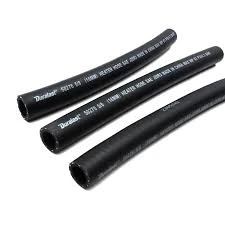Rubber Brake Line Maintenance and Performance Tips for Optimal Vehicle Safety
ພ.ຈ. . 26, 2024 22:43 Back to list
Rubber Brake Line Maintenance and Performance Tips for Optimal Vehicle Safety
Understanding Brake Line Rubber Importance, Maintenance, and Safety
When it comes to vehicle safety, one of the most critical components often overlooked is the brake system. Among the various elements that make up this crucial system, the brake line rubber plays a vital role in ensuring your vehicle stops effectively. In this article, we will explore what brake line rubber is, its significance, common issues, and tips for maintenance.
What is Brake Line Rubber?
Brake line rubber refers to the flexible hoses that connect the brake fluid reservoir to the brake calipers in a vehicle. These rubber hoses, often made from synthetic materials designed to withstand high pressure and varying temperatures, are crucial components of hydraulic brake systems. They are responsible for transferring hydraulic fluid from the master cylinder to the brakes, allowing the driver to control the braking force applied to each wheel.
Significance of Brake Line Rubber
The importance of brake line rubber cannot be overstated. Proper function of the brake lines is crucial for the effectiveness of the entire braking system. Any issues with the brake line rubber can lead to leaks, reduced brake responsiveness, or complete brake failure, which can have catastrophic consequences.
1. Safety The primary role of brake line rubber is to ensure that brakes engage smoothly and effectively when needed. A compromised brake line can lead to delays in braking, significantly increasing the risk of accidents.
2. Performance Good quality brake line rubber contributes to optimal braking performance. When the hoses are in good condition, they efficiently transfer the hydraulic fluid needed for powerful braking action.
3. Durability High-quality brake line rubber is designed to withstand wear from heat, pressure, and environmental conditions. Over time, however, even the best materials can degrade, making regular inspection essential.
Common Issues with Brake Line Rubber
Just like any other part of a vehicle, brake line rubber can face several issues over time. Here are some common problems
1. Cracking and Dry Rot Exposure to environmental elements, extreme temperatures, and chemicals can cause the rubber to crack or deteriorate. This wear can lead to leaks, which diminishes braking power.
brake line rubber

2. Bulging or Swelling This occurs when the internal pressure exceeds the design specifications. A bulging hose may rupture, leading to instant brake failure.
3. Corrosion Although rubber itself doesn't corrode, the metal fittings connected to the hose can. Corrosion can eventually affect the integrity of the connection, leading to leaks.
4. Kinked or Twisted Lines Improper installation or damage can result in kinked or twisted lines that restrict fluid flow, impacting brake performance.
Maintenance and Inspection
To ensure your brake line rubber remains in good condition, regular inspection and maintenance are key. Here are some tips
1. Visual Inspections Occasionally check the brake lines during routine maintenance for any visible signs of wear, such as cracks, leaks, or bulging.
2. Listen for Unusual Sounds If you hear hissing, squeaking, or grinding noises when braking, it may be an indication of a problem with the brake line or other brake components.
3. Monitor Brake Performance Any changes in how your brakes respond—such as a spongy feel or longer stopping distances—should prompt immediate investigation.
4. Professional Service It’s essential to have a qualified mechanic conduct a thorough inspection and replace worn brake line rubber. Professional technicians can also bleed the brake system after replacing lines to ensure optimal performance.
Conclusion
Brake line rubber plays an integral role in automotive safety and performance. By understanding its functions and the common issues that can arise, vehicle owners can take proactive steps to maintain their braking systems. Regular inspections and prompt maintenance are key to ensuring that your vehicle's brakes function reliably. Remember, safe driving begins with well-maintained brakes. Don't overlook brake line rubber—your safety might depend on it.
